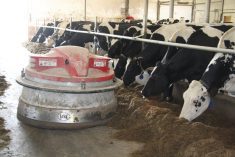A swine feed ration rich in flax, grains and other nutrients has led to the creation of enhanced pork products grown in Manitoba.
Prairie Orchard Farms of Winnipeg, through its parent company, Max-Pro Feeds, began experimenting with special diets seven years ago to produce pork with enhanced levels of omega 3. It went on to become the first company to sell its polyunsaturated enhanced meat as a specialty product in Canada and the United States.
The company received Canadian Food Inspection Agency approval last year to label the product as omega 3 enriched. Earlier this year it gained U.S. Department of Agriculture approval to also list that the product has increased levels of selenium, said company president Willy Hoffmann.
Read Also

Manitoba extends Crown land rent freeze
Manitoba government links the continued rental rate freeze on grazing and forage leases to economic and environmental challenges facing the industry
The challenge was to make the pork more nutritionally beneficial while maintaining a tasty product.
“Through the seven year process of designing this product, we have sent samples to chefs through different facilities in Manitoba. They all came back and said it was an exceptionally tasty product,” Hoffman said.
The product is sold mostly through restaurants and seniors homes in Alberta, Manitoba and Ontario. It is marketed under the Verdancia Farms label in the U.S. for an extra 25 to 30 cents per serving. Premiums are shared with the contracted producers in Manitoba.
“We have waiting lists of about 20 to 25 farms that are interested in joining once demand for the product increases,” said Hoffmann.
The company produces about 50,000 pounds of pork per week, requiring up to 350 hogs. The hogs are slaughtered between 120-125 kilograms at Premium Meats in Iowa.
The company is able to segregate its processing lines to accommodate specialty pork products like functional foods or organic meats. Product destined for Canada is shipped back.
Contracted producers must be certified with the Canadian Quality Assurance food safety program for animal health as well as the management requirements from Prairie Orchard Farms. No meat or bone meal supplements are allowed.
Selenium enriched pork starts with a corn-soybean ration with selenium yeast supplement. The omega 3 diet includes grains and oilseeds with a heavy reliance on flax, along with minerals and vitamins to stabilize the fat. The animals receive the diet for two months.
“There is a very specific time period that is required in order to increase the content in the muscles and the fat,” Hoffman said.
The pork has been developed to stay fresh on the shelf as long as the traditional product.
“Omega 3s are considered less stable than typical fats so we had to do something with the diet to increase the shelf life,” he said.
Omega 3 is deposited in the fat while selenium is found in lean muscle. Modern pork is lean, but the feeding regime has put fat traces known as marbling back into the muscle.
“When we designed this program, one of the results is that it is a more marbled product so we have a good level of omega 3s throughout.”
To gain USDA approval, 18 months of test records were required to show fat levels were consistent. This testing must continue on a regular basis to maintain the health claims.
Omega 3 is beneficial in reducing the risk of heart disease, high blood pressure, autoimmune diseases and bowel and kidney disorders.
As a micronutrient, selenium is essential in the proper functioning of the body’s antioxidant enzyme systems. Insufficiency can lead to increased risk of cancer or viral infections.















